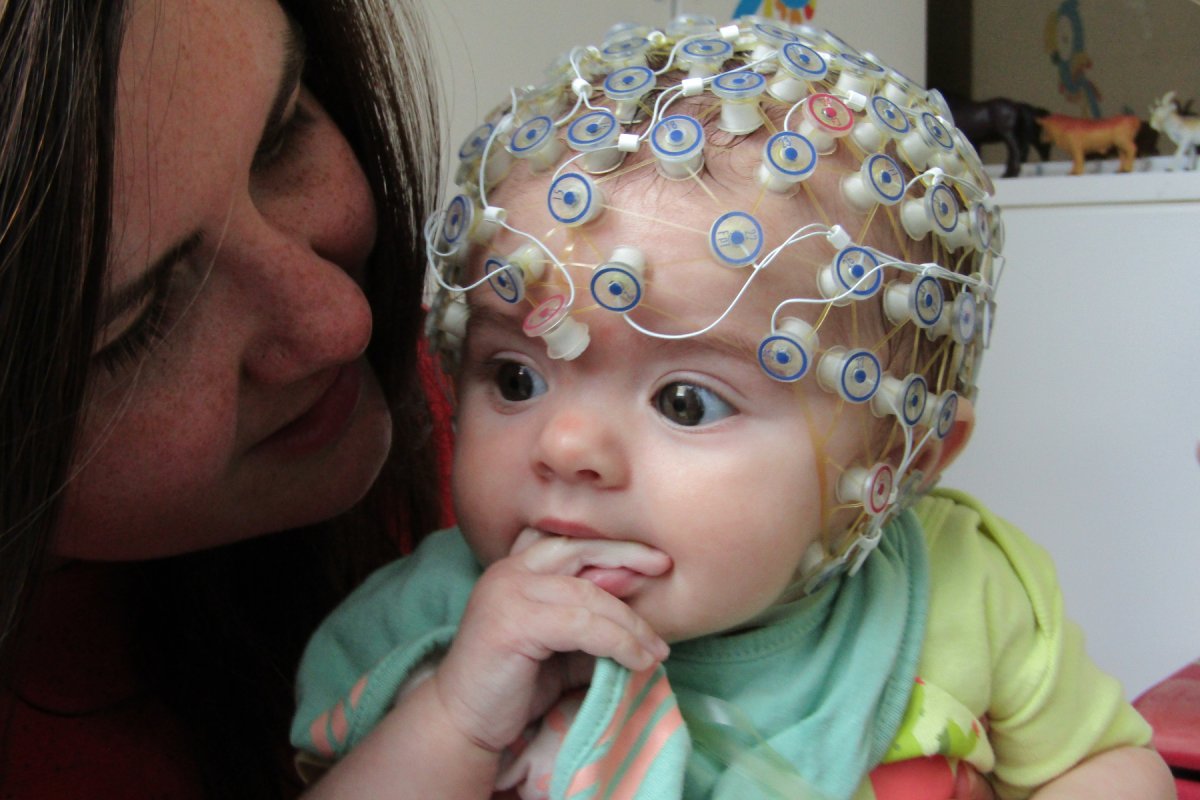Babies aged only a few months old might be smarter than we think, scientists have found.
Four-month-old babies appear to be able to understand the world around them, making sense of how their bodies interact with their environments, according to a new study in the journal Scientific Reports.
"We speculate that young babies, who are working hard to learn about the world around them, dedicate more "processing energy" to predictable events, events that make sense in their everyday experience (such as a touch following approaching motion) because processing these events helps them to build their mental models of the world," Giulia Orioli, a research fellow in psychology at the University of Birmingham and study co-author, told Newsweek.
The researchers from the Birmingham BabyLab measured the babies' brainwaves as they showed an object moving around on a screen. When the ball appeared closest to the babies, they were given a small vibration on their hands, representing a "touch." They found that after four months of age, the babies showed increased somatosensory, or tactile, brain activity when the touch was preceded by the screen object moving toward them.

"We measured what is called a somatosensory evoked potential (SEP) from over the touch regions of the infants' brains. That is, we measured the brain's response to the touches," Orioli said.
"We were interested in whether this SEP was modulated by the nature of the visual information leading up to the touch. Because it was, we are able to conclude that some of the functional connections between the senses (here touch and vision) which support a sense of the body or self, are in place at least from 4 months of age.
"In particular, we found that in the younger age group (babies aged around 4 months), the brain response to the touch was enhanced when the touch could have been predicted based on the direction of previous motion. When we say that the response was 'enhanced,' we mean essentially that more neurons spiked in response to an expected touch vs an unexpected touch."
This surprised the researchers, as they did not expect babies so young to be able to process their surroundings so sophisticatedly.
"These results were quite unexpected with such young babies," Orioli said. "Four-month-olds still have rather limited visual experience of the surrounding environment, and they are yet to learn to purposefully interact with it (for example, reaching for objects is not achieved before 5 months of age, on average), and therefore it is quite impressive that they show these brain responses already before the onset of skilled action."
The scientists also found that the babies aged 8 months and over showed brain signals indicating they were surprised when the touch on their hands came after the ball on the screen moved away from them instead of towards them.
"Older infants, instead, showed a larger response to a touch following receding motion, which is a touch that, at least from our adult point of view, is rather unpredictable. We don't actually know that the infants were surprised," Orioli said.
"However, our interpretation of the finding that the older 8-month-old infants showed an enhanced SEP when touch was presented after the ball moved away is that in the first year of life, infants are developing predictions about tactile events (e.g., learning to predict that the approaching ball would lead to a touch), and this is apparent when these older babies showed a greater somatosensory response when the ball had moved away from them (they processed the unexpected touch more).
"We know that adults' brains have a mechanism that detects the so-called 'prediction errors:' our brains respond to those instances when the events that we experience contradict the predictions that we make based on our internal models of the world. We speculate that our older participants, who show larger responses to unpredictable touches, may be starting to show the early signatures of this mechanism."
The researchers hope to look into how even younger babies react to the object moving and the touch signal. They want to investigate the early signs of these abilities to sense the world around them in newborns.
"We are now investigating this with a group of even younger babies (1st month of life) to see if we can find out something more on the impact of prenatal as well as very early postnatal experience in shaping infants' knowledge of the relationship between themselves and the world around them," Orioli said.
"We know that young infants can learn lots about their sensory environments from early on (even in utero). However, we know much less about how they can learn about the relationship between the world and themselves across their senses. How infants can learn about links between touch and vision is important for understanding the origins of body perception and self-awareness, but this has been studied very little until this point."
Do you have a science story to share with Newsweek? Do you have a question about babies? Let us know via science@newsweek.com.
Update 11/21/23, 12 p.m. ET: This article was updated with comment from Giulia Orioli.
Uncommon Knowledge
Newsweek is committed to challenging conventional wisdom and finding connections in the search for common ground.
Newsweek is committed to challenging conventional wisdom and finding connections in the search for common ground.
About the writer
Jess Thomson is a Newsweek Science Reporter based in London UK. Her focus is reporting on science, technology and healthcare. ... Read more





